
1. Conflict & Negotiation
1.1. Constructive Conflict
1.1.1. does it really work?
1.1.1.1. does seem to open up discussion effectively
1.1.1.2. involves people in healthy debates
1.1.1.3. covers all the issues - all points of view can be heard and considered
1.1.2. is it a smart idea?
1.1.2.1. seems to be very difficult to manage effectively
1.1.2.2. loaded weapon - generating conflict could backfire if handled badly
1.1.3. Can turn negative when personal feelings and pride become involved
1.2. Negotiation Management
1.2.1. Continuous Questioning is important
1.2.1.1. Understand the view of the other side by asking questions
1.2.1.1.1. Suffolk vs. 11 Beacon - concerns over lack of sunlight due to underlying concern that this would effect tenancy/revenue negatively - if this is known alternate solutions can be acheived (which have nothing to do with the surface issue of sunlight)
1.2.1.2. Get "underneath" the problem to understand motivations behind it
2. Leadership
2.1. Jeffrey Smith Case
2.1.1. Different people have different leadership needs
2.1.1.1. Need to be receptive to it though, otherwise little will happen
2.1.2. The Elephant Test = a situation in which an idea or thing "is hard to describe, but instantly recognizable when spotted"(Wikipedia ref)
2.1.3. Admitting fault is important
2.1.3.1. Is it possible to lead without respect? No, I don't think so. This seems important
2.2. Heifetz Article
2.2.1. see the bigger picture
2.2.2. giving "the work back" to people
2.2.3. draw attention to the issue
2.2.3.1. New node
2.3. Rise of the team
2.3.1. open communication
2.3.2. most problems today are too complex for just a few people to handle
3. Groups/Teams
3.1. Everest simulation
3.1.1. should you place your own needs first?
3.1.1.1. In the shortrun this seems to work, but in the longrun, you may have divided the trust/power of the team
3.1.1.1.1. no single branch is stronger than many branches, the team is important to future success
3.1.2. what needs are most important? Individual or the group?
3.1.2.1. Group think is "bad", but Teams are "good" - how does this reconcile?
3.1.2.2. choosing your own best interest over that of the team, can frequently break the trust of the team
3.1.3. There was only one person that summited. Being only one person means they must have left their team behind completely - would this have been a good idea in a real life situation?
3.1.3.1. The more groups "got along", the lower the scores were - does this provide validation about "constructive conflict" being essential to a productive team?
